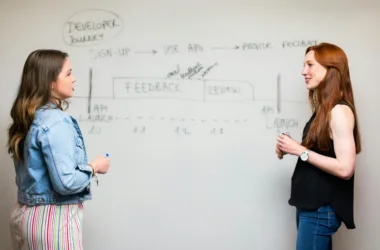The ever-evolving realm of technology presents a multitude of exciting opportunities, and software engineering stands at the forefront.
If you’re fascinated by the potential of code to create, solve problems, and drive innovation, then a career as a software engineer might be your perfect fit.
This comprehensive guide will unveil the various pathways to becoming a software engineer, equipping you with the knowledge and resources to embark on this rewarding journey.
Building a Strong Foundation: Education and Core Skills
While there’s no single path to becoming a software engineer, a solid foundation in computer science principles is highly recommended. Here are some common educational routes:
Bachelor’s Degree in Computer Science
This comprehensive degree program equips you with a deep understanding of computer science fundamentals, programming languages, algorithms, data structures, software engineering principles, and problem-solving methodologies.
Bootcamps and Online Courses
Intensive boot camps and online courses offer a faster track to acquiring the necessary programming skills and project experience. These options can be particularly suitable for those with prior experience in related fields or a strong foundation in mathematics and logic.
Essential Programming Languages to Learn
As you delve into the world of software engineering, proficiency in certain programming languages is crucial. Here are some of the most in-demand languages:
- Python: A versatile and beginner-friendly language widely used for web development, data science, and machine learning.
- Java: An object-oriented language known for its robustness and security, making it popular for enterprise applications and Android development.
- JavaScript: The backbone of interactive web development, essential for building front-end web applications.
- C++: A powerful and efficient language used for system programming, game development, and performance-critical applications.
Beyond Languages: Honing Your Skills
While programming languages are fundamental tools, a successful software engineer possesses a broader skillset:
- Problem-Solving and Analytical Thinking: The ability to break down complex problems into manageable steps, analyze potential solutions, and think critically is essential.
- Data Structures and Algorithms: Understanding how data is organized and manipulated, along with efficient algorithms for solving computational problems, is crucial for writing efficient and scalable code.
- Object-Oriented Programming (OOP): A fundamental programming paradigm that allows for code reusability, maintainability, and modularity. Mastering OOP concepts is essential for building complex software systems.
Experience is Key: Building Your Portfolio
Hands-on experience is invaluable in the eyes of potential employers. Here are some ways to gain practical experience:
Personal Projects
Develop personal projects that interest you. This allows you to experiment with different technologies, showcase your creativity, and build a portfolio that demonstrates your skills.
Open Source Contribution
Contributing to open-source projects allows you to collaborate with experienced developers, learn from real-world codebases, and gain valuable experience working on large-scale software projects.
Internships and Hackathons
Seek internship opportunities or participate in hackathons to gain practical experience in a professional setting, learn from industry experts, and network with other developers.
The Art of the Job Search: Resumes, Cover Letters, and Interviews
Once equipped with the necessary skills and experience, it’s time to showcase your talents to potential employers. Here are some key aspects of the software engineering job search:
- Crafting a Compelling Resume: Tailor your resume to highlight the specific skills and experiences relevant to the target position. Quantify your achievements whenever possible to showcase the impact of your work.
- Writing Effective Cover Letters: Go beyond simply restating your resume. Use your cover letter to express your passion for software engineering, highlight your unique strengths, and explain why you’re a perfect fit for the company and role.
- Preparing for Technical Interviews: Technical interviews often involve coding challenges, problem-solving exercises, and discussions about your software development experience. Practice your coding skills, be prepared to articulate your thought process, and demonstrate your ability to learn and adapt.
Lifelong Learning: A Continuous Journey
The software development landscape is constantly evolving. To stay relevant and competitive, a commitment to lifelong learning is essential.
Here are some ways to stay ahead of the curve:
Online Resources
Numerous online resources like tutorials, articles, and video courses offer opportunities to learn new technologies and stay updated on industry trends.
Technical Books and Publications
In-depth technical books and publications provide a deeper understanding of complex concepts and best practices.
Industry Events and Conferences
Participating in industry events and conferences allows you to network with other professionals, learn about cutting-edge technologies, and gain valuable insights from industry leaders.
The Rewarding Path of a Software Engineer
A career in software engineering offers a multitude of challenges, opportunities for growth, and the immense satisfaction of crafting solutions that shape the digital world. Here’s a glimpse into what awaits you:
Diverse Career Paths
Software engineering offers a wide range of specializations, from web development and mobile development to data science, machine learning, and artificial intelligence.
You can explore and find a niche that aligns with your interests and skillset.
Lucrative Opportunities
Software engineers are consistently in high demand, and the field offers competitive salaries and attractive benefits packages.
Continuous Learning and Innovation
The ever-evolving nature of technology ensures that there’s always something new to learn and exciting challenges to tackle. This keeps the work dynamic and intellectually stimulating.
Problem-Solving at its Core
If you enjoy tackling complex problems and crafting innovative solutions, software engineering offers a platform to make a real impact. The satisfaction of seeing your code come to life and solve real-world problems is highly rewarding.
The journey to becoming a software engineer requires dedication, perseverance, and a passion for learning. Embrace the challenges, celebrate the victories, and enjoy the process of continuous learning and growth.
With hard work and a commitment to excellence, you can carve your path in this exciting and ever-evolving field.
Conclusion
The world of software engineering beckons those with a creative mind, a problem-solving spirit, and a desire to make a difference.
By equipping yourself with the necessary knowledge, skills, and experience, you can embark on this rewarding career path and become a vital force in shaping the technological landscape of tomorrow.
So, are you ready to embrace the challenge and become a software engineer?
FAQs
What is needed to become a software engineer?
- Strong foundation in computer science (degree, bootcamp, or online courses)
- Proficiency in programming languages (Python, Java, JavaScript, etc.)
- Problem-solving, analytical thinking, and a passion for learning
Is it hard to be a Software Engineer?
It requires dedication and continuous learning, but rewarding for those who enjoy challenges and problem-solving.
What is the best age to become a software engineer?
There’s no specific age! As long as you have the drive to learn, you can pursue a software engineering career at any stage.
Can a 20-year-old be a software engineer?
Yes, definitely! With the right education (degree, boot camp) and strong programming skills, age 20 can be a great time to start.
Who is the youngest software engineer?
It’s difficult to pinpoint the absolute youngest due to varying job titles and definitions. However, many young people enter the field in their teens or early twenties.






